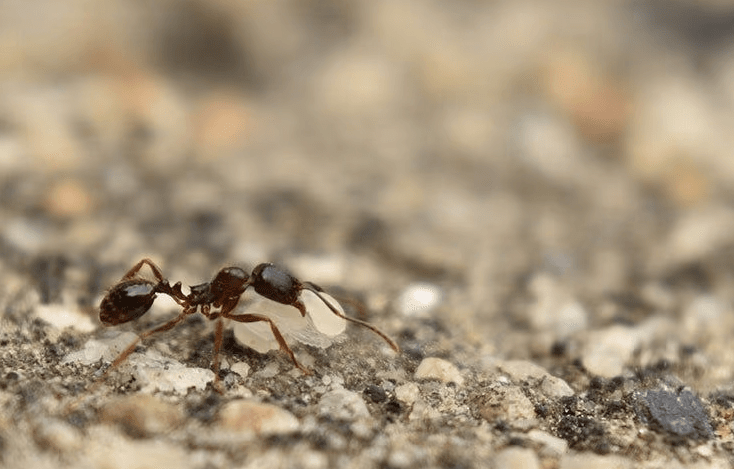
Pavement Ant Identification & Prevention In Nassau & Suffolk County, NY
What do pavement ants look like?
Latin name: Tetramorium caespitum
Color: Pavement ants are light brown to black with appendages lighter than rest of the body.
Size: They are about 2.5 to 3 mm long, with parallel lines on head and thorax.
Antennae: They have 12-segmented antennae with a three-segmented club.
How did I get pavement ants?
Underneath and beside sidewalks, patios and driveways are ideal habitats for these pests. Because they live near homes, pavement ants often make their way inside looking for food sources such as sweets, proteins and dead insects. While cracks in foundations, basement floors and walls, plus concrete slabs may let them indoors initially, the crumbs, trash, and open food containers they find encourage them to return and become a pest problem. Pavement ants like to feed on leftover pet food either inside or outside the home.

How serious are pavement ants?
In yards, pavement ant colonies live deep under the soil, making control hard for homeowners. Large numbers of these pests around kitchens or lawns can be a nuisance, especially during mating swarms. The ants will sting if provoked, but are usually very docile and unlikely to sting.
How do you get rid of pavement ants?
All State Pest Control is trained to help manage Pavement Ants and similar pests. Since every building or home is different, your All State Pest Control technician will design a unique program for your situation.
Keeping ants out of homes and buildings is an ongoing process, not a one-time treatment. All State Pest Control’s exclusive A.I.M. solution is a continuing cycle of three critical steps — Assess, Implement and Monitor.
All State Pest Control can provide the right ant control solution to keep ants in their place…out of your home, or business.
What are the signs of pavement ants?
Worker pavement ants are the most likely sign, but other indicators can be small piles of excavated materials or even the swarmers. Pavement ants invade buildings while foraging for food. Nests are outdoors under stones, along curbs or in cracks of pavement. They can nest indoors in walls and under floors.

Reasons to Choose All State Pest Control
-
Hablamos EspañolPest control services provided by a Spanish-speaking team.
-
Emergency Services AvailableGet the immediate help you need, whenever you need it.
-
100% Satisfaction GuaranteeWe're so confident you'll be happy with our services, we guarantee it.
-
Offering 100% Free QuotesGet started by giving us a call and setting up a free estimate.
Do pavement ants bite?
Pavement ants don’t bite, although they do possess the ability to sting. Pavement ants are docile and not aggressive, preferring to avoid confrontation rather than stinging to defend themselves.
What do pavement ants eat?
Pavement ants will feed on a wide variety of foods, including meats, grease, live and dead insects, seeds and honeydew from aphids. They prefer to eat greasy foods, and can eat many foods consumed by humans. They forage for food for their colonies and set up trails to food sources from their nests. Pavement ant workers enter houses to forage and can become a nuisance when large groups infest a kitchen or garden patio. They can sting and bite.

Hear From Our Happy Customers
At All State Pest Control, your satisfaction is our priority! See for yourself what people have to say about working with us.
-
“I highly recommend this business as they are very professional and reasonably priced.”- Stray C.
-
“The job was very thorough, very reasonably priced and Tom was very professional.”- Patrick M.
-
“So happy we used this company and will be using them again! Great work great owner and great service.”- Stefani J.
-
“For bringing them so much work they occasionally offer us free treatments and that is just good business!”- Derek B.
Where do pavement ants nest?
These ants are found throughout the United States and are major pests in the Midwest. Pavement ants earned their name because they nest in cracks in driveways and under sidewalks, piling the resulting dirt in a mound on top of the pavement.
Pavement ants also dwell in the undersides of logs, bricks, stones, patio blocks and boards. Pavement ants may also nest under mulching or open soil close to building foundations. They also can nest indoors, such as under floors, inside insulation and within walls.
The nests of pavement ants are difficult to locate, so the most efficient way to manage an infestation is to contact a pest control professional.
What is the reproduction and life cycle of pavement ants?
Pavement ants undergo complete metamorphosis, passing through the egg, larval and pupal stages before becoming mature adults.
Reproduction occurs when winged males and females swarm, often in June and July. After mating, the females search out a new nesting site and become the queen for a new colony.
Colonies
A typical colony of pavement ants includes multiple queens and numerous workers. A queen establishes a new colony of pavement ants by laying eggs. Pavement worker ants then tend the queen’s brood until they develop into adults. During their development, broods are transferred from location to location to protect them from fluctuations in moisture and temperature.



